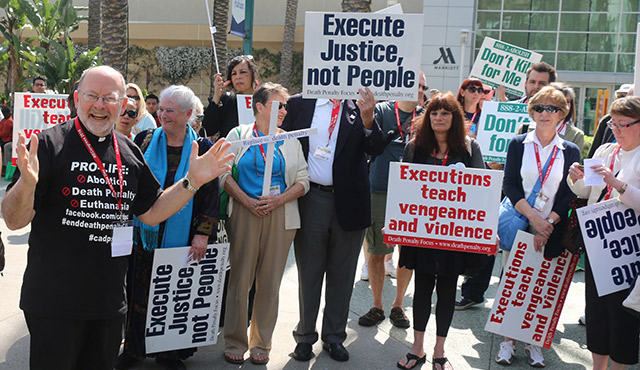The story was nothing short of tragic. Cameron Todd Willingham burned and destroyed his home in Corsicana, Texas, on Dec. 23, 1991. The inferno claimed the lives of his three young children. Willingham was charged with murder, put on trial and ultimately executed by the State of Texas on Feb. 17, 2004.
But this story has one problem: There is overwhelming evidence that Willingham didn’t do it.
A December 2010 Opinion and Order by the 299th District Court in Travis County exonerated him, concluding that, “This Court holds that the State of Texas wrongfully executed Cameron Todd Willingham.”
In other words, the state killed an innocent man.
Protecting those wrongfully accused of murder is only one of the reasons why millions believe it’s essential to stop capital punishment in California. This polarizing issue led to the inclusion of Propositions 62 and 66 in next month’s General Election. Prop. 62 would put an end to the death penalty, while Prop. 66 would mandate several modifications to it.
“Proposition 66 wants to speed up executions, just like they do in Texas,” says Beth Webb, sister of Laura Webb Elody, one of those killed at Salon Meritage, in Seal Beach, in October 2011. Despite being the relative of a murder victim (her mother, Hattie Stretz, also shot in the deadliest mass shooting in Orange County history, survived), Beth Webb has been speaking out in favor of the Yes on 62 / No on 66 position to stop capital punishment, a viewpoint strongly supported by the Catholic Church.
“My case is the poster child FOR the death penalty,” Webb says. “But I know it’s just wrong.”
This divisive issue has been a source of debate for well over a century. Capital punishment in California was first authorized in 1872. The state carried out its first execution, by hanging, in 1893. The gas chamber replaced hanging in 1937. In February 1972, the California Supreme Court ruled that the death penalty was a form of cruel and unusual punishment; however, the state legislature re-enacted it in 1977. Later that year, the Penal Code was revised to include the sentence of life imprisonment without the possibility of parole. Death by lethal injection was added in 1992, and the use of the gas chamber was discontinued two years later. In July 2014, U.S. District Judge Cormac J. Carney ruled that the death penalty was unconstitutional, noting that it was arbitrary and hampered by delays; that ruling was overturned the following year by the U.S. Court of Appeals for the Ninth Circuit.
To most Catholics, “death penalty controversy” is an oxymoron, since it’s in no way controversial.
“Catechism is very clear that the death penalty is no longer realistic in modern society,” says Steve Pehanich, the California Catholic Conference’s director of Advocacy and Education. “The teachings of the last three popes have been very clear that the death penalty isn’t necessary.”
Webb has another way of putting it: “An eye for an eye for revenge is just ridiculous. It’s just silly.”
Prop. 62 is supported by the California Catholic Conference, Catholics Against the Death Penalty, Clergy & Laity for Economic Justice, the Catholic Bishops of California and Pope Francis.
If Prop. 62 passes, convicted murderers would have zero chance of parole. It would require them to work to pay restitution to the victims’ families. And it would retroactively apply to all prisoners currently on death row.
Supporters maintain that California’s death penalty system is flawed. Every attempt to fix it in the last four decades has failed. The state’s independent legislative analyst reported that Prop. 62 would save $150 million per year. And the measure would provide closure for the victim’s families.
“California’s death penalty system [has resulted in] a long, agonizing ordeal for our family,” Webb wrote in the California General Election Official Voter Information Guide. “As my sister’s killer sits through countless hearings, we continually relive this tragedy. The death penalty is an empty promise of justice.”
Backers of Prop. 66 claim that it would speed up the death-penalty appeals process, stipulating that legal challenges to death sentences take no more than five years by putting trial courts in charge of initial petitions that appeal convictions, establishing a time frame for death penalty review and requiring appointed attorneys to work on death penalty cases.
The Pro-62/Anti-66 camp argues that Prop. 66 would cost taxpayers millions of dollars due to increased prison spending, legal defense and litigation. And it would increase California’s risk of executing an innocent person.
“Abolishing the death penalty is central to what [California’s] bishops have said in all their statements,” Pehanich says. “And Pope Francis has said that there is simply no humane way to kill another person.”
Religious conviction aside, Prop. 62 would stop the endless pain endured by victims’ relatives due to never-ending appeals to save murderers on death row, Web notes. When someone like the perpetrator who killed her sister gets free press during the lengthy post-verdict battle, he draws the attention he’s always wanted.
“He killed as many people as possible because of the infamy that comes with it,” Webb says. “With [Prop.] 62, we’ll never hear from him again. The years of pain are gone. What it would do for my family and so many others is get that closure.”
For more information, search for “62 and 66” at Ballotpedia (ballotpedia.org); and “California Capital Punishment” at FindLaw (public.findlaw.com).

